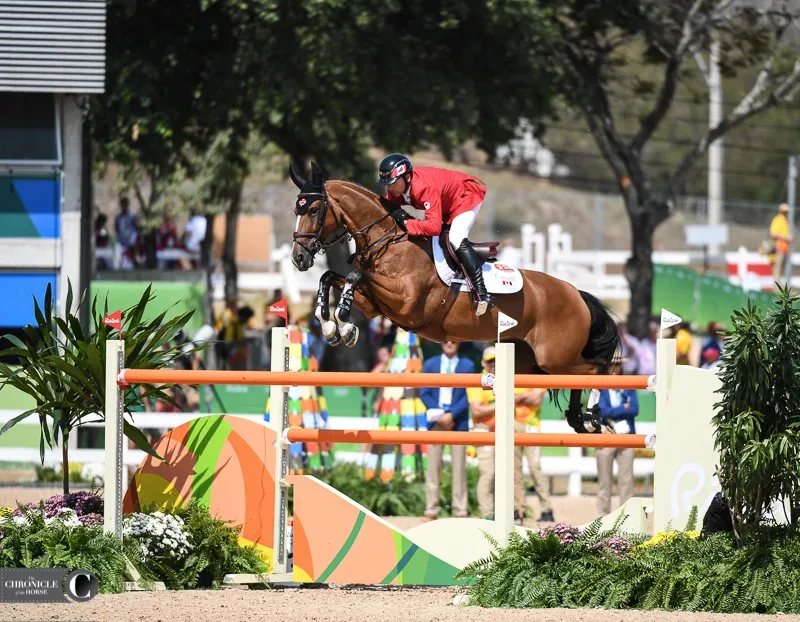A Florida appeals court last week reversed a lower court’s judgement against Eric Lamaze, finding the lower court “abused its discretion” and denied the Canadian Olympian due process when, during a September 2023 hearing, it ruled against him after granting his attorney’s request to withdraw from representing him.
The Florida Fourth District Court of Appeals on April 30 reversed Palm Beach County Circuit Court Judge Maxine Cheeseman’s November 2023 default judgement against Lamaze, which determined he owed approximately $1.4 million to Lorna Guthrie, Jeffrey Brandmaier and their Knightwood Stables for the purchase and sale of two horses including Nikka VD Bisschop, a mare who has since represented Canada at the 2023 Pan American Games (Chile) and 2024 Paris Olympic Games.
Along with reversing Cheeseman’s decision, Chief Appellate Judge Mark Klingensmith wrote in a concurring opinion that he also would have reversed her finding that Lamaze committed fraud upon the court by lying about his cancer treatment. He called Lamaze’s behavior “egregious” but said his lies did not affect the facts at the heart of the case, which is about the purchase and sale of the two horses.

With the reversal, the case has been remanded back to Palm Beach County Circuit Court.
“This decision effectively resets the legal process,” a firm representing Lamaze wrote in a press release. “The case will now proceed on its merits in an adversarial process, restoring Eric Lamaze’s right to a hearing. It is worth recalling that two earlier judgments in this matter had ruled in his favor before his ability to defend himself was stripped under questionable circumstances.
ADVERTISEMENT
“He now admits that the court received inaccurate medical certificates during that confusing period,” the released continued. “These documents were subsequently submitted—out of context—to the American proceedings (as well as to the FEI) by a Canadian lawyer who obtained them from his assistant without his knowledge. This was a serious error, for which he accepts responsibility, but it should not justify the deprivation of his fundamental right to a fair defense—as the Court of Appeal has now recognized.”
The appeals court found that Lamaze was denied due process when his attorney’s request to withdraw from representing him and his companies, Torrey Pines Stables and Little Creek Investments, was granted at the beginning of the September 2023 hearing in which Cheeseman subsequently allowed the plaintiffs to submit evidence that, the appellate court wrote, an attorney should have objected to, if Lamaze had one, and questioned Lamaze directly. The appeals court noted that while a person can choose to represent himself in court, a corporation cannot represent itself, and Lamaze and his companies should have been given a 30-day continuance after his attorney’s motion to withdraw was granted to find new counsel.
“[T]he trial court granted the motion to withdraw at the onset of the hearing, leaving Lamaze unrepresented for the hearing. The trial court also conducted most of the examination here, but … the trial court did not “amply protect” Lamaze’s interests,” the court wrote in its reversal. “For example, after granting Lamaze’s counsel’s motion to withdraw, the trial court admitted all of the appellees’ exhibits as unopposed even though many of the exhibits contained hearsay.”
Hearing the motion to strike all of Lamaze’s pleadings without him having legal representation put him at “a significant disadvantage,” the appellate court wrote.
“[Guthrie and Brandmaier] relied on affidavits and evidence that should have been objected to as hearsay,” the judges wrote. “Further, as noted in the concurring opinion, other arguments could have, and should have, been made. The court questioned Lamaze itself, sometimes cutting off his responses. The court made its own objections that some of Lamaze’s responses were irrelevant or hearsay, and then granted those objections.
“In his testimony, Lamaze himself complained that he could not get an attorney,” the opinion continued. “In sum, Lamaze was not provided a full and fair opportunity to defend the motion to strike, which is tantamount to a denial of due process.”
ADVERTISEMENT
The September hearing was not about the facts at the heart of the horse-dealing case, the appeals court noted, but about Lamaze’s attorney submitting forged medical documents in an effort to change court dates for hearings about writs of attachment and garnishment, granted to Guthrie and Brandmaier earlier in the case, that froze Lamaze’s bank accounts. His attorney submitted the forged documents as “proof” he would be unable to participate in a later hearing date. At the September hearing, Guthrie and Brandmaier’s attorneys argued successfully to Cheeseman that Lamaze’s pleadings related to the writs should be struck because he committed fraud on the court.
In his concurring opinion on the reversal, Klingensmith added that while he agreed with reversing Cheeseman’s decision on due process grounds, he also would have reversed the lower court’s finding that Lamaze had committed a fraud on the court by lying about his medical treatments.
“This most severe of sanctions is typically reserved for fraud that goes to the heart of the case,” Klingensmith wrote, noting that in this case, while Lamaze’s “conduct was certainly egregious,” the fraud only resulted in the rescheduling of the writs hearing.
“The factual disputes of the underlying case were unrelated to whether, where, or when Lamaze was undergoing cancer treatments. Thus, while appellants had committed a fraud on the trial court by misrepresenting Lamaze’s status as a cancer patient, the fraud did not ‘interfere with the judicial system’s ability impartially to adjudicate a matter…’ ”
As the case returns to Palm Beach County Circuit Court, Lamaze himself is “in an active phase of personal and professional reconstruction,” according to the press release from the agency representing him.
“Eric Lamaze has notably stayed in a rest home before resuming coaching activities and returning to riding,” it stated. “He aspires to make a positive change while also correcting any misconceptions.”














